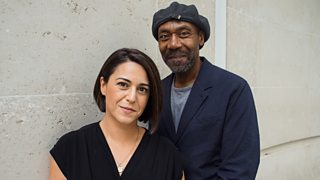
Ludwig van Beethoven: Ode to (Freedom)
An historic performance of Beethoven's Ninth Symphony on Christmas Day 1989 - after the fall of the Berlin Wall.
Christmas Day in 1989 came just six weeks after the fall of the Berlin wall. That day, an historic performance took place at the heart of what had been East Berlin - and before that, the centre of the whole city, before it was so cruelly divided in two.
Beethoven鈥檚 Ninth Symphony was to be conducted by Leonard Bernstein, and the venue was the Schauspielhaus, the centrepiece of an elegant ensemble of neo-classical buildings in a wide open square called the Gendarmenmarkt. The building itself was of historic significance to Germans, having hosted early performances of work by Goethe, Weber, Wagner and Mendelssohn. Allied bombs all but destroyed it in 1943, but it had been rebuilt in the 1980s as a major concert hall for East Berlin. A memorial statue to the great German poet Schiller stood guard in front of the entrance.
This Beethoven 9 concert had been Bernstein鈥檚 idea. Bernstein had, throughout his life, used his prominence and his art to make statements about social justice, human rights and other big questions of modern times. A few days before the performance, he was photographed joining thousands of people hammering pieces out of what remained of the Berlin wall.
Bernstein made a subtle but significant change to Schiller鈥檚 text. He replaced the word Freude with Freiheit - so it became an ode to Freedom instead of an Dde to Joy. There was a story that this was Schiller鈥檚 original intention in the early 1800s, but he had thought it might not get past the censors.
The concert was full of symbolism, as the two halves of Germany began the process of growing back together. The choice of Christmas day - and of a classical music concert - to celebrate this historic moment was significant: the Germans, it could be argued, had invented both Christmas and classical music. The architecture of the venue and the statue of Schiller outside represented the values of the Enlightenment, values which had been traduced by the barbarism of recent history. The choice of performers was symbolic too: the orchestra combined musicians from the four powers which had governed Berlin during its decades of isolation: Russia, France, Britain and Germany. Unusually for Beethoven鈥檚 9th, a children鈥檚 chorus was involved - a choir from Dresden who sang from memory. It was important that memories of this performance would stretch long into the future.
Bernstein was not in good health, but skipped onto the podium nonetheless. At times during the symphony, the pain and effort was apparent on his face: several times he grabbed the baton with both hands and sawed the air, as if he needed all his strength. At other times, he beamed with pure joy and ease. At the end of the performance, the standing ovation lasted for over ten minutes. Bernstein was presented with flowers and with a red and white flag showing the black bear of Berlin. Outside in the Gendermenmarkt, thousands of people who had stood in silence as they listened to the relay of the symphony joined in the cheering too.
This is one of 100 significant musical moments explored by 成人论坛 Radio 3鈥檚 Essential Classics as part of Our Classical Century, a 成人论坛 season celebrating a momentous 100 years in music from 1918 to 2018. Visit bbc.co.uk/ourclassicalcentury to watch and listen to all programmes in the season.
This is an excerpt from a recording made at the concert on 25 December 1989, conducted by Bernstein and featuring musicians from five orchestras and three choirs, plus soloists June Anderson, Sarah Walker, Klaus Konig and Jan-Hendrik Rootering.
Duration:
This clip is from
Featured in...
![]()
The music of Our Classical Century—Our Classical Century
100 recordings to celebrate 100 years of exciting, inspirational, rule-busting music.
More clips from Our Classical Century
-
![]()
Step outside your musical tribe
Duration: 02:49



